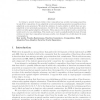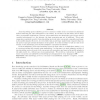469 search results - page 3 / 94 » On Adversary Models and Compositional Security |
CORR
2007
Springer
14 years 11 months ago
2007
Springer
We give a new, simulation-based, definition for security in the bounded-quantum-storage model, and show that this definition allows for sequential composition of protocols. Damg�...
CORR
2006
Springer
14 years 11 months ago
2006
Springer
Logics for security protocol analysis require the formalization of an adversary model that specifies the capabilities of adversaries. A common model is the Dolev-Yao model, which c...
103
click to vote
SCN
2008
Springer
14 years 11 months ago
2008
Springer
We present an implementation of the protocol of Lindell and Pinkas for secure two-party computation which is secure against malicious adversaries [13]. This is the first running sy...
EUROCRYPT
2004
Springer
15 years 5 months ago
2004
Springer
In trying to provide formal evidence that composition has security increasing properties, we ask if the composition of non-adaptively secure permutation generators necessarily pro...
119
click to vote
IACR
2011
13 years 11 months ago
2011
A zero-knowledge protocol allows a prover to convince a verifier of the correctness of a statement without disclosing any other information to the verifier. It is a basic tool a...


